The lead up
A draft open letter written by student activists last month tested the limits of what kind of public critique the administration is willing to take on its sexual assault policies, as the College of William and Mary remains under investigation by the Department of Education for its handling of Title IX issues. The letter, written by students affiliated with the health and wellness group Health Outreach Peer Educators, criticized administrative behavior the students perceived as overly concerned with public image at the expense of sexual assault survivors, and called on the administration to take four steps to improve the safety of students.
The students were motivated by a February 22 Global Film Festival screening of “The Hunting Ground,” which brought more than 200 students, administrators, Greek life leaders and faculty members together to watch the new documentary that investigated institutional cover-ups of sexual assault at colleges across the country.
In the weeks that followed the screening, HOPE members were active in considering ways they could improve responses to sexual assault at the College. The Wednesday after the screening, February 25, at a weekly HOPE meeting, the sexual health branch started brainstorming.
That conversation ended up becoming something larger. By March 25, the healthy relationships and sexual aggression branch of HOPE also became involved, and the two committees held a joint meeting to discuss potential avenues for advocacy. According to vice president of the sexual aggression branch Radha Yerramilli, the avenue that got the most traction was an open letter to College President Taylor Reveley and the Board of Visitors.
The group decided to ask the administration to place sexual assault statistics on the College’s website, improve efforts to solicit alumni donations for combatting sexual assault, list the on- and off-campus locations where sexual assault has been reported and update the College’s mission statement to include the safety and well-being of students. Four students were chosen to draft the letter.
That Sunday, three of those students — Jordan Taffet ’16, Taylor Medley ’17 and Thomas Northrup ’16 — met to work on a first draft. The result was a pointed critique of what they perceived to be administrative inaction and delay on matters of sexual violence prevention. Over the course of the next few days, the letter made it from the HOPE listserv to hundreds of students involved in Greek organizations and advocacy groups asking for signatures, support and edits. By all accounts, the letter was still in draft form.
The response: “A hand for collaboration”
“We are a group of disheartened and frustrated students, faculty, and staff disappointed by the lack of care and attention devoted to the issue of sexual violence on our campus,” the letter began. “We are tired of press releases, damage control, and other forms of evasion. We want transparency, honesty, and vulnerability.”
According to Eric Garrison, HOPE’s faculty advisor, the letter was read within minutes by administrators including Reveley and Vice President for Student Affairs Ginger Ambler ’88 Ph.D. ’06. A faculty advisor of one of the groups who received the draft letter forwarded the email to higher ups in the administration, Ambler said in an interview.
The response from the administration was swift.
“We met the next day, and I think the comment was, you know, everyone has seen this letter — everyone has seen this letter,” Garrison said, speaking of a meeting between himself, Ambler and Associate Vice President for Health and Wellness Kelly Crace. “I think I was called upstairs … and [Crace] was like, ‘Did you know about this,’ and I was like, ‘I knew about a letter, but I didn’t know about that letter, I didn’t know that was going out.’”
Garrison said the meeting was upbeat and productive.
“[It was] very cordial — nothing, nothing negative, I mean it was very positive. It was one of those meetings where it’s like, ‘This is a very good meeting,’” Garrison said. “It was so positive. It was like, if this is what [the students] are feeling, they should come to talk to us about this.”
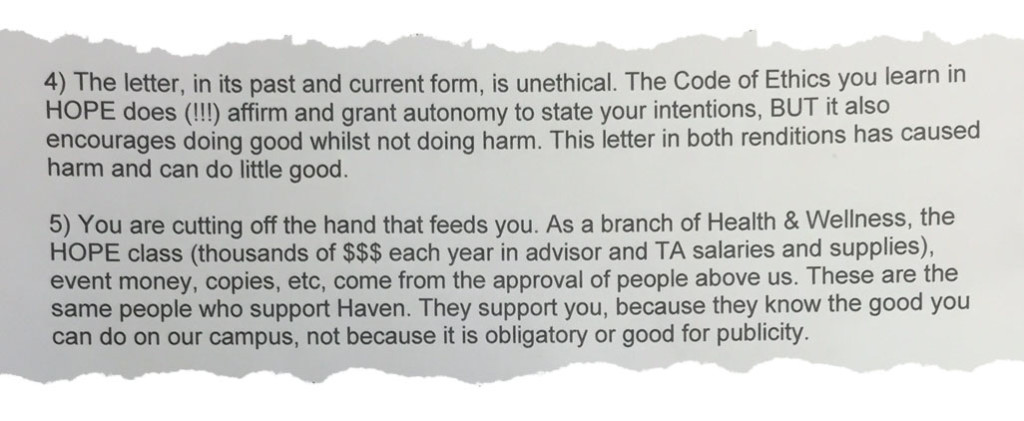
A series of emails Garrison sent to the writers of the letter immediately following the meeting with Crace and Ambler, obtained by The Flat Hat, conflict with such a positive account.
“[T]he Senior Administration is feeling slightly frustrated for donating money to one of the causes that HOPE supports, as they feel stabbed in the back,” Garrison said in an email. Garrison continued in the email, saying he would no longer be seeking funding from the administration for an upcoming conference HOPE members had been planning on attending.
After receiving an interview request from a Flat Hat reporter several days later, Garrison forwarded the request to students. Garrison said that the letter was misinterpreted as a statement from HOPE — HOPE, as an organization, had not signed the letter — and that, as peer educators, HOPE members were expected to respond more positively to stressful situations.
“You are cutting off the hand that feeds you. As a branch of Health & Wellness, the HOPE class (thousands of $$$ each year in advisor and TA salaries and supplies, event money, copies, etc, come from the approval of people above us. These are the same people who support [The] Haven,” he said in an email April 6. “Let’s proceed cautiously and wisely.”
The letter, which was scheduled to be published in The Flat Hat April 7, was postponed. Two new writers, Liz Jacob ’17, vice president of HOPE’s sexual health branch, and Lauren Dybel ’17, the group’s recruitment chair, drafted a second letter, which was similar to the first but less confrontational. That letter, which both Jacob and Dybel continue to stand by, will also not be published by HOPE. The Flat Hat has made this letter available online.
“As the distribution of our letter had the ultimate goals of positive, real, and measurable change in the handling of sexual violence at our school, HOPE is amending our approach to make this change,” Outreach Chair Amanda Olsen ’17 wrote in an email April 8. “Vice President Ambler has extended a hand for collaboration, and we are excited to take her up on that offer. We have set up a meeting to discuss what the administration is currently working on and how our four goals (outlined previously in the letter draft) can be accomplished.”
Jacob said that meeting with the administration would lack some of the benefits of printing a letter for the community.
“I didn’t want to write a letter because I felt I had a better idea than anyone else, or that I was the best person to talk about it, or because if I met with Ginger Ambler or Taylor Reveley everything would change,” Jacob said. “I wanted to write a letter so that every person on this campus who ever felt that this was a problem, or who ever faced anything in the realm of sexual assault, or who had a friend go through that … or felt that they can be doing more for this campus — I want them to be able to read a letter and know we are working for it and people wouldn’t let this issue die. … And for me that’s why it is so hard to accept the fact that right now this is just one meeting with Ginger Ambler. And maybe that’s where it starts. But I don’t think we will let it end there, something that’s just another couple [of] students on a task force.”
A member of HOPE’s executive board, who did not want to be named in conjunction with this article, said that no meeting with Ginger Ambler had been scheduled as of April 22.
“We have … not heard any information on when a meeting will happen. I’m sure with what happened last week we, understandably, got pushed back,” she said, referring to the death of Paul Soutter ’17 on April 13.
A Flat Hat reporter met with Ambler about this article the afternoon of April 14.
Jacob said that while she understands why HOPE could not publish the first letter, it is hard for her to accept that they would not be publishing the second version. Taffet, who helped write the first draft, said in an email that he believed that it was a mistake to send out the early draft to administrators. Dybel, as well as Taffet’s co-writers Taylor Medley and Thomas Northrup, declined to be interviewed on the record.
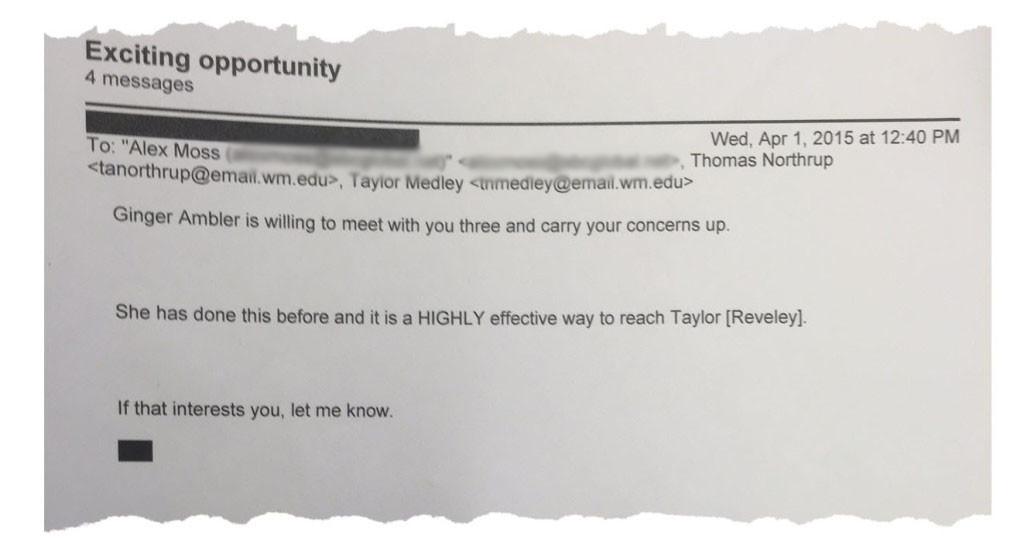
Dybel only said she continued to support publishing the second letter, but only as an individual. Medley and Northrup would only say that they believed the first letter, once published, would speak for itself.
Ginger Ambler said that no funding decisions were influenced by the letter, and both Ambler and Garrison pointed out that the HOPE students did receive the money they requested for the conference mentioned in Garrison’s email.
“Funding decisions are made independently based on the merit of the event, and to me, this whole question of the open letter, to me is an opportunity for dialogue and learning,” Ambler said.
In a later email, she said she valued the work that HOPE does.
“I have been and remain a strong supporter of HOPE and the outstanding education and prevention work they do on a wide range of health and wellness issues,” she wrote later in an email.
Ambler, chair of the Task Force on Preventing Sexual Assault and Harassment, said that she wished the students had approached her before they sent the letter out.
Ambler said that the task force had been working on many of the issues that the students raised in the letter. She said that alumni donations played a large role in combating sexual violence on campus, noting that the funding for Sexual Assault Awareness Month speaker Nancy Donoval had been allocated from private gifts.
Ambler said that earlier this year, the College’s Strategic Planning Steering Committee approved adding language to the Strategic Plan, which included providing a safe environment free of assault and harassment. She said that sexual assault data from the campus climate survey was forthcoming.
An intimate connection: “Don’t bite the hand that feeds you”
HOPE has a more intimate relationship with the administration than almost any other student group on campus. To become a member of HOPE, “HOPEfuls,” as they’re called, must attend a semester long class as well as pass an application process which includes interviews.
There are no completely independent groups on campus that combat sexual violence, but HOPE receives much of the funding as well as administrative attention. HOPE is the only student group on campus for which a class is taught.
In HOPE class, students learn that the organization is contained within a division of Student Affairs, under an umbrella of health and wellness, alongside the Health Center, the Counseling Center and Campus Recreation. A PowerPoint from a HOPE class indicates that three college employees are affiliated with HOPE.
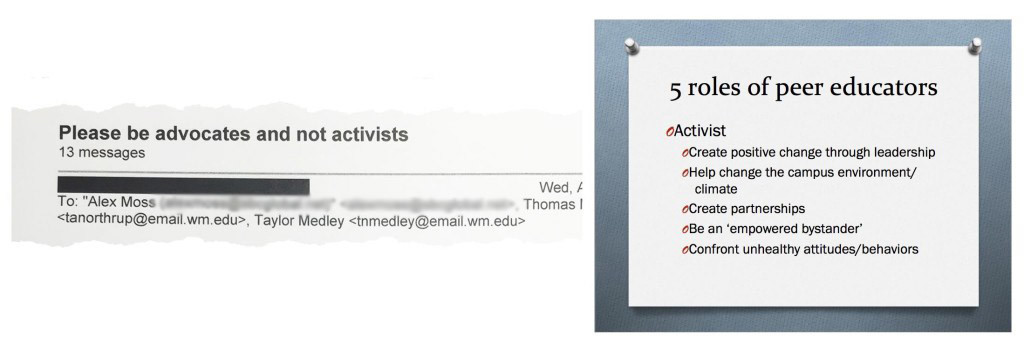
“HOPE is a unique piece, it’s a branch of Health Promotion, it receives a ton of money, a ton of training,” Garrison said.
Sam Dunham ‘15, President of Someone You Know, another group that combats sexual assault, said that Someone You Know values funding from the administration and could not do its work without it, but that his group was not as closely tied to the administration as HOPE.
“I will say that something we value as a group is the fact that we aren’t directly under any branch of the administration. We are a student group,” he said.
Dunham said Someone You Know benefited from the logistical support of HOPE and its members.
VOX: Voices For Planned Parenthood, which combats sexual aggression, receives funding from Student Assembly, but generally not more than about $100. Medley, co-writer of the first draft of the open letter, is VOX’s vice president.
HOPE’s close relationship with the administration raises questions about the independence that activists have to criticize the administration’s efforts to reduce instances of sexual violence on campus at a time when the administration is under investigation for potential Title IX abuses.
Neither Yerramilli nor Jacob said that a member of HOPE could publish a letter criticizing the administration’s efforts without damaging the organization’s ability to do work in the future.
“I don’t know if I can even answer that question, yeah, I think, I don’t know,” Jacob said. “I think there could be times when anybody is funded by the school, or even supported by other student organizations, that will make you a little less critical.”
Yerramilli said that although she couldn’t support the letter as a member of HOPE’s executive board, as an individual she supported the writers of the letter and the feelings expressed.
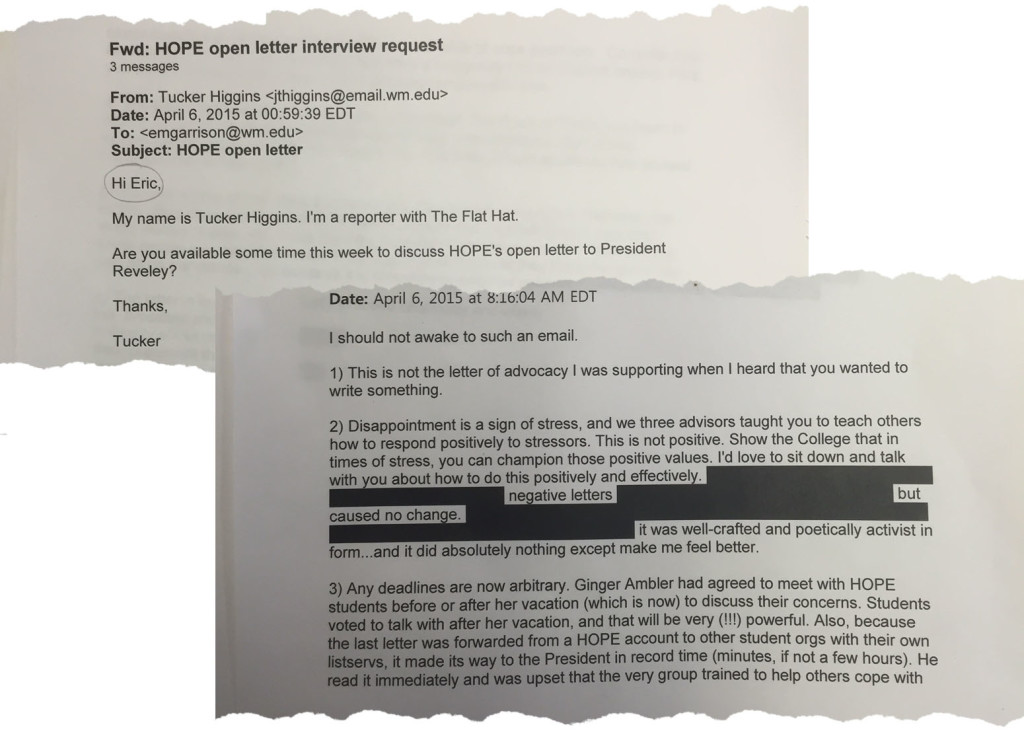
“Being an organization that’s close to the administration there is, I mean, there are things we have to patch up,” Yerramilli said. “As an organization that works so closely with the administration you have to be able to look at a situation and say, ‘This is where we are and how can we be closer to creating a safe environment for students.’”
Garrison said he supports autonomy, but to a point.
“There are universities that believe in total self-governance, and you end up with 50 Harry Potter groups,” he said.
He said he did not support a mechanism that would protect HOPE’s funding.
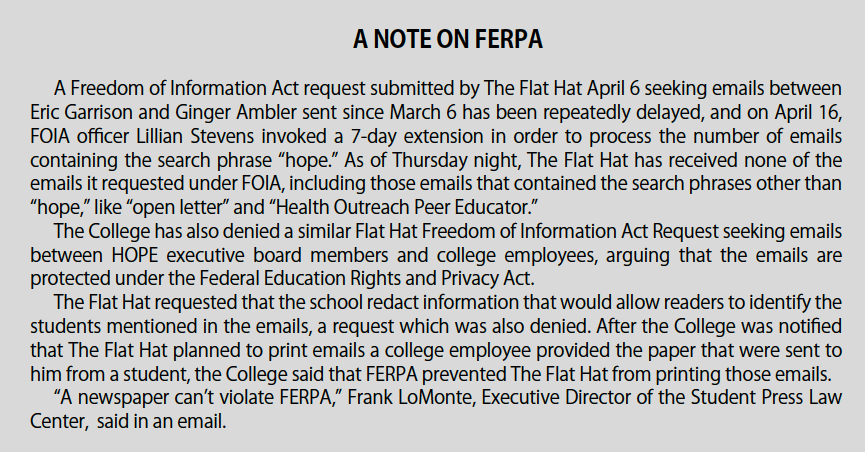
“They could put [the letter] on a billboard, they could publish it in The Flat Hat, they could stand at the Crim Dell and shout it with bullhorns, but how effective is that? Are they trying to show the world that they’re angry? They have been taught how to intervene,” he said.
While students would be permitted to write whatever they wanted, Garrison added that a special relationship exists between the administration and those it funds.
“It goes back to don’t bite the hand that feeds you,” he said. “There’s nothing unethical about writing to people or complaining to people who do that, who are supporting you, but if you want to show support and get support, there needs to be that quid pro quo there.”
Looking ahead: “It’s about forgiveness and moving forward”
In an email, Taffet, co-writer of the first letter, said he believed the issue was in the past.
“This is a case of a work-in-progress being released before it was ready — a misunderstanding at most,” he wrote. “I do believe that HOPE and the administration have moved on from this mistake.”
Two days after the letter was sent out, Alex Moss ’16 sent an apology email to Eric Garrison to forward to Ambler. The email was obtained by The Flat Hat.
“I am the member of HOPE who initially suggested the writing of an open letter addressed to the administration to the Flat Hat newspaper,” he wrote. “I do not believe the original contents of the letter reflect an understanding of the administration’s obstacles in reaffirming a commitment toward sexual assault prevention. Placing the College’s sexual assault statistics online, where they could be easily accessible, may deter prospective students or cause public outcry.”
Moss added that he sympathized with the administration having to deal with Board of Visitors on matters like this one. He also said that he believed that threats to withdraw funding from student groups were unethical.
Moss declined to comment for this article. Ambler said that she never received the email.
Other HOPE members have refused to apologize for the contents of the letter and have said that their ultimate goals — working with the administration to reduce sexual violence on campus — have not been impeded.
Yerramilli said that moving forward on the four goals laid out in the letter was more important than any awkwardness HOPE members might feel at meeting with the administration.
“It’s about forgiveness and moving forward,” she said. “Forgiving that they feel they have done what they need to do. … The pushing that we do on the administration is not to continue pushing, it’s to make sure that students on campus … feel safe and comfortable, and as long as there are students who don’t feel safe and comfortable, we will do what we can do to make sure the administration is listening.”
Jacob added that the activism did not end with the letter.
“I think I can speak for everyone who wrote this letter, when I say, none of us are going to let this go.”
Editor’s Note: This article has been updated to reflect comments made by Jordan Taffet ’16 after publication, who said that he believed that it was a mistake to send out the early draft of the letter to administrators.

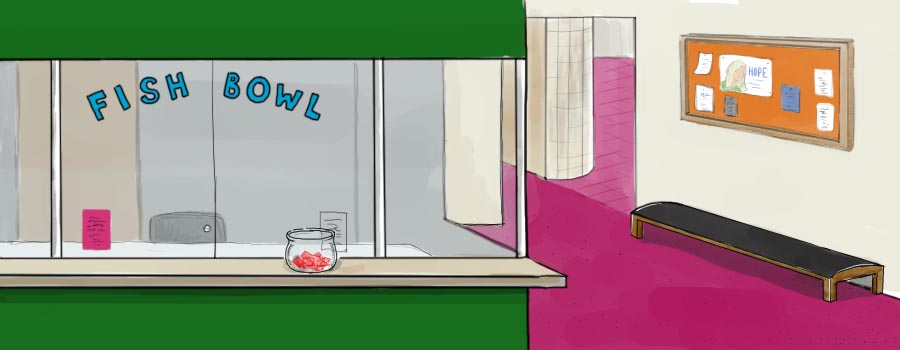
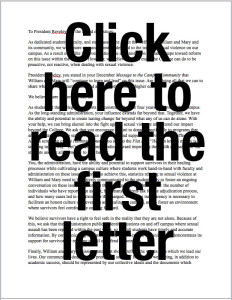

It’s hard to believe the idea that the administration is trying to do good as its first priority if it is unwilling to accept criticism on the issue
I take a lot of issue with this article. It should be mentioned significantly earlier that the authors of this letter, at least taft, retracted what they wrote. It should also be clearly highlighted that this letter was not a hope sponsored program. In the process of distributing the letter was also significantly edited. Poor journalism and bad facts.
Also lazy journalism picking and choosing emails to share
I comment
I have nothing but praise for the Flat Hat for taking its role as campus watchdog seriously in this matter. This is an in-depth article that gives facts, not opinions, and unabashedly describes a present issue in the college. Whether or not one believes the topic of this article, the letter itself, was well-thought-out or inadvisable is beside the point; I find this article to be excellent, living up to a standard of journalistic excellence that far-too-many mainstream or professional publications do not follow. (As a point of full disclosure, I am a friend of Tucker Williams, and as such am biased in his favor.)
I take issue with the below commentator, one “Henry,” who criticizes this article from behind the mask of anonymity. He calls this article “sloppy journalism,” and says ” It should be mentioned significantly earlier that the authors of this letter, at least taft, retracted what they wrote. It should also be clearly highlighted that this letter was not a hope sponsored program.” I would like to point out that all of these facts are present in the article; your quibbles, such as they are, are purely stylistic and do not concern the factual substance of the article.
My greatest concern raised in this article is the issue pointed out in an aside regarding a Freedom of Information request on behalf of the Flat Hat. College and University administrations have a duty to serve as role models in this regard, conforming to the spirit and not just the letter of the law. Most certainly, it is not right for a University to actively discourage public debate, to say (incorrectly) that the Flat Hat is bound by law to not publish certain emails. If our Universities will not actively promote the values of a free and open society, who will?
Jacob Keohane, William and Mary Class of 2016
I have nothing but praise for the Flat Hat for taking its role as campus watchdog seriously in this matter. This is an in-depth article that gives facts, not opinions, and unabashedly describes a present issue in the college. Whether or not one believes the topic of this article, the letter itself, was well-thought-out or inadvisable is beside the point; I find this article to be excellent, living up to a standard of journalistic excellence that far-too-many mainstream or professional publications do not follow. (As a point of full disclosure, I am a friend of Tucker Higgans, and as such am biased in his favor.)
I take issue with the below commentator, one “Henry,” who criticizes this article from behind the mask of anonymity. He calls this article “sloppy journalism,” and says ” It should be mentioned significantly earlier that the authors of this letter, at least taft, retracted what they wrote. It should also be clearly highlighted that this letter was not a hope sponsored program.” I would like to point out that all of these facts are present in the article; your quibbles, such as they are, are purely stylistic and do not concern the factual substance of the article.
My greatest concern raised in this article is the issue pointed out in an aside regarding a Freedom of Information request on behalf of the Flat Hat. College and University administrations have a duty to serve as role models in this regard, conforming to the spirit and not just the letter of the law. Most certainly, it is not right for a University to actively discourage public debate, to say (incorrectly) that the Flat Hat is bound by law to not publish certain emails. If our Universities will not actively promote the values of a free and open society, who will?
Jacob Keohane, William and Mary Class of 2016
I have nothing but praise for the Flat Hat for taking its role as campus watchdog seriously in this matter. This is an in-depth article that gives facts, not opinions, and unabashedly describes a present issue in the college. Whether or not one believes the topic of this article, the letter itself, was well-thought-out or inadvisable is beside the point; I find this article to be excellent, living up to a standard of journalistic excellence that far-too-many mainstream or professional publications do not follow. (As a point of full disclosure, I am a friend of Tucker Higgins, and as such am biased in his favor.)
I take issue with the below commentator, one “Henry,” who criticizes this article from behind the mask of anonymity. He calls this article “sloppy journalism,” and says ” It should be mentioned significantly earlier that the authors of this letter, at least taft, retracted what they wrote. It should also be clearly highlighted that this letter was not a hope sponsored program.” I would like to point out that all of these facts are present in the article; your quibbles, such as they are, are purely stylistic and do not concern the factual substance of the article.
My greatest concern raised in this article is the issue pointed out in an aside regarding a Freedom of Information request on behalf of the Flat Hat. College and University administrations have a duty to serve as role models in this regard, conforming to the spirit and not just the letter of the law. Most certainly, it is not right for a University to actively discourage public debate, to say (incorrectly) that the Flat Hat is bound by law to not publish certain emails. If our Universities will not actively promote the values of a free and open society, who will?
Jacob Keohane, William and Mary Class of 2016